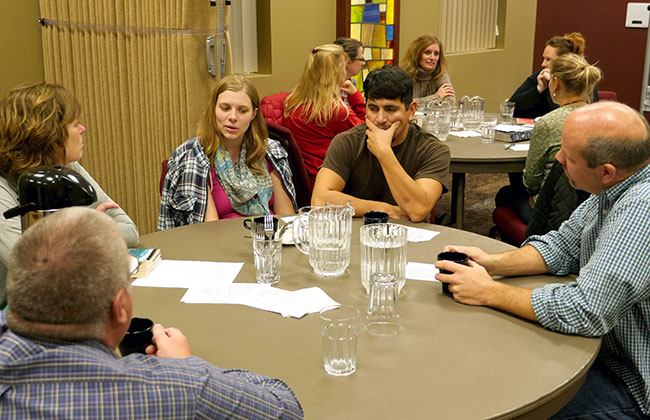The congregation of Trinity Reformed is learning how to read the Bible. It’s a simple step with far-reaching results.
One church reads the Bible to reach out
For the past year and a half, Trinity Reformed Church in Orange City, Iowa, has been teaching its people to read the Bible. It may seem elementary, but that’s the point.
“How else can we know [Christ]?” asks Michelle Christy, an elder at Trinity. “This is the tool he has given us. Apart from the Word, we can’t know him.”
Christy is on a team of people from Trinity who are participating in the RCA’s Holistic Discipleship Leadership Community, which gathers teams of leaders from a number of churches. Together they examine and develop their congregations’ discipleship practices. Because of that leadership community, Trinity has committed to giving the congregation the tools to read the Bible well.
“We are trying to get our folks to be self-feeders,” says Bob De Boer, associate pastor at Trinity and a member of the leadership community. “How do we help them get in the Word so God can transform them through the Word?”
To help the congregation become “self-feeders,” Trinity has adopted a process of reading Scripture in its Go Groups, groups of three or four people who gather specifically to read the Bible together.
The process involves studying several passages that relate to one of 12 topics foundational to the Christian faith—prayer or the Holy Spirit, for instance. For each passage, group members read the verses, write them out verbatim, and then summarize them in their own words. After becoming familiar with the passage, the group answers two basic questions: (1) What does this passage say about God? (2) What does this passage say about me or about humankind? Finally, each person identifies one step of obedience that he or she will take in response and then names one person with whom to share what he or she has learned.
“[This method has] brought people to a deeper place in their Bible reading,” says De Boer. “It’s easier to read the Word of God devotionally or allow the pastor or leader to grow for us, but [it’s more valuable] to help people to see that God has a rich storehouse of growth—of himself—that he wants us to experience.”
None of these efforts, though, are intended simply to improve the spiritual depth of church members.
“We believe that transformation is not just about learning the Bible or growing closer to Christ ourselves but about taking seriously our call to make disciples,” says De Boer. “Discipleship for us is our evangelism strategy, our outreach strategy…In some ways, the overarching thing for us to be missional is discipleship.”
And disciples are being made.
“[We’re] watching God bring some folks that have not traditionally been in or around the church,” says Christy. “God has been drawing some of these people to Trinity. They are encountering and experiencing God in worship.”
De Boer trusts that there is more growth ahead: “[Being missional is] not waiting until you’re fully grown until you reach out. We have confidence when we’re walking with God. We have more boldness to step out in those risky places—could be your next-door neighbor or across the world. It feels scary, but we’re [hopeful about] the transformation God is doing.”
Join an upcoming holistic discipleship leadership community. Email Jill Ver Steeg at transformation@rca.org.
Find a sample outline for Trinity’s Bible reading method at www.rca.org/biblereading.
Whenever you read Scripture, take a moment to consider how you can obey or share the passage.
[Photo courtesy Bob DeBoer]





